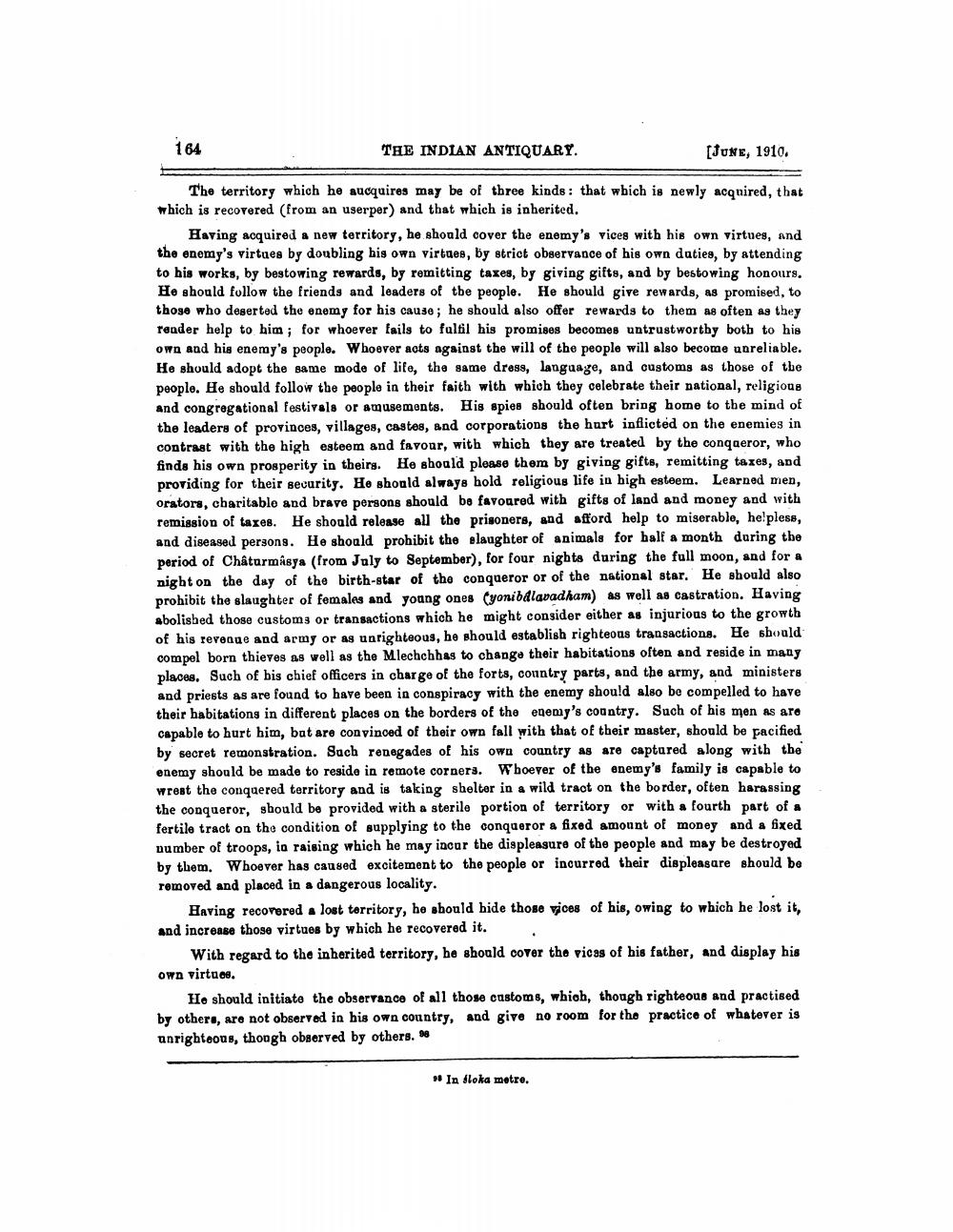________________
164
THE INDIAN ANTIQUARY.
[JUNE, 1910.
The territory which he aucquires may be of three kinds: that which is newly acquired, that which is recovered (from an userper) and that which is inherited.
Having acquired a new territory, he should cover the enemy's vices with his own virtues, and the enemy's virtues by doubling his own virtues, by strict observance of his own duties, by attending to his works, by bestowing rewards, by remitting taxes, by giving gifts, and by bestowing honours. He should follow the friends and leaders of the people. He should give rewards, as promised, to those who deserted the enemy for his cause; he should also offer rewards to them as often as they render help to him; for whoever fails to fulfil his promises becomes untrustworthy both to his own and his enemy's people. Whoever acts against the will of the people will also become unreliable. He should adopt the same mode of life, the same dress, language, and customs as those of the people. He should follow the people in their faith with which they celebrate their national, religious and congregational festivals or amusements. His spies should often bring home to the mind of the leaders of provinces, villages, castes, and corporations the hurt inflicted on the enemies in contrast with the high esteem and favour, with which they are treated by the conqueror, who finds his own prosperity in theirs. He should please them by giving gifts, remitting taxes, and providing for their security. He should always hold religious life in high esteem. Learned men, orators, charitable and brave persons should be favoured with gifts of land and money and with remission of taxes. He should release all the prisoners, and afford help to miserable, helpless, and diseased persons. He should prohibit the slaughter of animals for half a month during the period of Châturmasya (from July to September), for four nights during the full moon, and for a night on the day of the birth-star of the conqueror or of the national star. He should also prohibit the slaughter of females and young ones (yonibalavadham) as well as castration. Having abolished those customs or transactions which he might consider either as injurious to the growth of his revenue and army or as unrighteous, he should establish righteous transactions. He should compel born thieves as well as the Mlechchhas to change their habitations often and reside in many places. Such of his chief officers in charge of the forts, country parts, and the army, and ministers and priests as are found to have been in conspiracy with the enemy should also be compelled to have their habitations in different places on the borders of the enemy's country. Such of his men as are capable to hurt him, but are convinced of their own fall with that of their master, should be pacified by secret remonstration. Such renegades of his own country as are captured along with the enemy should be made to reside in remote corners. Whoever of the enemy's family is capable to wrest the conquered territory and is taking shelter in a wild tract on the border, often harassing the conqueror, should be provided with a sterile portion of territory or with a fourth part of a fertile tract on the condition of supplying to the conqueror a fixed amount of money and a fixed number of troops, in raising which he may incur the displeasure of the people and may be destroyed by them. Whoever has caused excitement to the people or incurred their displeasure should be removed and placed in a dangerous locality.
Having recovered a lost territory, he should hide those vices of his, owing to which he lost it, and increase those virtues by which he recovered it.
With regard to the inherited territory, he should cover the vices of his father, and display his own virtues.
He should initiate the observance of all those customs, which, though righteous and practised by others, are not observed in his own country, and give no room for the practice of whatever is unrighteous, though observed by others. 98
* In Sloka metre.




